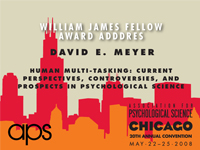Connecting Behavior and Health Before Birth
What happens in the womb doesn’t always stay there.
That was the message during the cross-cutting Brain, Body, Behavior, and Health program at the APS 20th Annual Convention. More and more, psychological scientists are realizing how events that take place during pregnancy, or shortly after, can impact a person’s health across the lifetime.
David Amaral, University of California, Davis, presented research on a topic at the forefront of public interest — causes of autism. Certain antibodies passed from mother to fetus could lead to the disorder in some cases, said Amaral.

Amaral and collaborator Judy Van de Water, Ph.D. reached this conclusion by studying the immune systems of children with autism and their mothers. Antibodies typically protect the body; sometimes, though, children with autism produce antibodies that are directed at the brain and are not found in typically developing children.
These abnormal antibodies can can alter development of the brain — the amygdala and the hippocampus, for example — and in turn cause cognitive problems or even epilepsy, which is a common symptom in autistic children.
Of interest to Amaral is the recent finding that about 20% of the mothers of children with autism also produce unusual antibodies. These antibodies are directed specifically at the fetal brain. Perhaps one cause of the disorder, then, is a mother passing the antibodies to her child through the placenta, disrupting development of the brain in some way.
By injecting these antibodies into monkeys, Amaral has found one of the diagnostic features of autistic children, stereotypical behaviors during the first year after birth. Monkeys, for example, performed unusual back flips over and over again for minutes. They also engaged in incessant pacing behaviors.
Understanding the role of immune system irregularities in autism could, in time, lead to interventions. Predictive tests, or even having a surrogate carry the child, could decrease the chance of the child receiving the harmful antibodies in utero. If in the future such methods were successful, some cases of autism might be avoided.
In his own studies with monkeys, Christopher Coe, University of Wisconsin-Madison, has found that a stressed mother can damage the immune system of a baby beyond repair.
Coe exposed pregnant monkeys to an “acoustical startle” — the scientific term for a blasting car alarm. He then tested the newborns and found a long list of cellular and immune system differences that led to a simple conclusion: stress matters.
Merely looking at the cellular activity of a two-year-old monkey, Coe can tell if its mother was stressed during pregnancy.
So why do these prenatal effects linger long after birth? Much of the answer has to do with iron. When a mother is stressed, she suppresses the vital nutrient — which plays a role in white blood cell count and the ability to fight disease — and passes less of it to the fetus. As a result, these babies have half the iron they need to grow normally.
They also have 10 percent less volume in the hippocampus than babies born under normal conditions — even at age three.
But “this is not just a monkey story,” says Coe. Women of low socioeconomic status and teenage mothers often show signs of decreased iron.
Low socioeconomic status, and the stress it causes on growing children, was the underlying theme of the work presented by APS Charter Member Karen Matthews, University of Pittsburgh. Over time, this stress can put a person at greater risk for heart disease.

In one test, Matthews presented adolescents with an ambiguous scenario — a security guard confronting you about a bag — that could be interpreted as either helpful (the bag is returned to you) or offensive (you might have stolen something).
The adolescents from low socioeconomic status households took a far more negative view of the situation, often becoming angry.
This propensity to make negative interpretations of even ambiguous situations can cause someone to see the world as “a threatening place that requires constant vigilance.” Constant vigilance seems to heighten a person’s level of arousal.
Such a mindset, in turn, can put the body through a perpetual wear and tear that eventually leads to coronary problems. In another test, adolescents with a propensity to make negative interpretations had a higher heart rate while sleeping.
“There is a physiological cost of adapting to a threatening world that may extend to when a person is sleeping,” Matthews said.
The talk was not all gloom and doom. Alison Fleming, University of Toronto, discussed work that shed light on the complex neurological changes that take place in a mother during pregnancy and just after birth.
In her work with rats, Fleming has demonstrated that mothers display behavior after their children are born that simply was not there before.
Before giving birth, for example, a rat shown newborn pups might actually eat them. After just a few days of being pregnant, however, a rat presented with pups might display some of the natural maternal behavior — such as licking them intensely — that she would show her own babies.
“Maternal responsiveness increases across pregnancy” because of hormonal changes, Fleming said.
These changes are very strong — stronger than cocaine, in fact, Fleming has found. In one experiment, she presented rats with two chambers, one holding the narcotic and the other holding rat pups. Though rats typically prefer the cocaine, for several days right after giving birth, they actually preferred to engage with the pup chamber. (In the end, though, they returned to the drug.)
Another change had to do with newborn odors. In a study done with human participants, non-mothers preferred Gorgonzola cheese or various spices presented in a blind smell test. New mothers, though, were attracted to the odors of their child without even realizing it.
By the second day of motherhood, Fleming says, these moms recognize their baby’s odor “by much greater than chance.”
In many of her studies Fleming’s principal focus was an area of the brain called the nucleus accumbens, and its release of dopamine. When properly stimulated, she said, even virgin rats “become maternal very, very quickly.”
“It is appropriate to start with the mother,” said Fleming, “because she is the most important person in the world.”
Researchers are gaining remarkable new insights into prenatal and perinatal development. Still, as Coe noted, “the most important nine months of our lives are probably the nine months that we know the least about.”




APS regularly opens certain online articles for discussion on our website. Effective February 2021, you must be a logged-in APS member to post comments. By posting a comment, you agree to our Community Guidelines and the display of your profile information, including your name and affiliation. Any opinions, findings, conclusions, or recommendations present in article comments are those of the writers and do not necessarily reflect the views of APS or the article’s author. For more information, please see our Community Guidelines.
Please login with your APS account to comment.